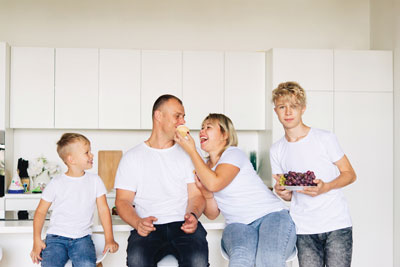
by Sally-Ann Makin
Potter’s Houses Nursery settings and Makin Connections – Family Consultancy
Growing up I had a very tricky relationship with food. It still isn’t great now but I’m aware of it and I know my mind and body well enough to know when I’m making poor choices. I grew up in the midst of “There are starving children around the world” and a wooden spoon punishment if you didn’t finish your dinner. Many people my age had the exact same consequences to not eating. Sadly, it was the norm.
We know better now but I find many parents and practitioners that I meet through the nursery still use threats and negative language at mealtimes with children and I’m curious as to why I can’t seem to find any training on the adverse affects of the ‘sandwiches first’ attitude. Speaking to another parent Jamie-Leigh Nicholls, a child nutrition enthusiast, confirmed there was very little coverage on this – so here we are.
My relationship with food was something I never even acknowledged was a problem until I started a job as a nanny for a wonderful family and my employer just happened to be Dr Anna from ITV’s This Morning. At that time she wasn’t yet doing TV but she was still very much a Clinical Psychologist, primarily for children with eating disorders. I’d never even considered children would suffer from eating disorders but sadly it’s happening all around the world and some of the causes and issues stem from the language and attitude parents have towards food. Anna taught me to think differently when addressing my eating habits and slowly I began to find other coping mechanisms for anxiety than controlling myself with food.
I contact Anna for all manner of advice and regardless of how busy she is, she consistently makes time to support me because she is so incredibly passionate about children accessing a naturally healthy lifestyle. Some things I have learned from Dr Anna are: Children need to SEE us eating healthily and HEAR us speaking positively about food, they need to have access to a wide range of options and they need to be involved with preparing meals and see that cooking and eating can be so much fun. They need us to model healthy eating habits – children naturally mimic what they see us do and say, so showing them that you make good choices with food will encourage them to do the same. “Inconvenient truth” says Anna on her platform, “You can’t make your kids eat. You can’t force them to love fruit and vegetables and relish fruit. All you can do is model a good relationship with food, create an environment where food and eating are stress free, and meals are times of happiness, connection and bonding. The rest will come.”
Anna speaks about the deprivation effect on her Instagram – the deprivation effect is one of the main causes of cravings leading to eating disorders. Because you want what you can’t have, removing certain foods from your diet or your child’s diet has the opposite affect and instead of disallowing ‘bad’ foods, it encourages impulsive eating. An example of this is saying ‘no more sweets’ to yourself and to them.
Using food as a reward can be really detrimental to a child’s thoughts surrounding food and choices. Rewarding them with sweet treats for good behaviour, even rewarding ourselves with a glass of something at the end of a hard day, gives food moral value and makes us use food and drink to manage our emotions which was my issue and can be quite harmful. Children who grow up linking food with behaviour become adults who reward or punish themselves with food.
I think what we need to really be thinking about is our language towards food during family mealtimes. There is no such thing as ‘good’ and ‘bad’ food and labelling foods as ‘negative’ or ‘positive’ can give children a complex about their behaviour if they eat it.
In educational settings, hearing staff tell children to eat sandwiches first because they need the ‘good’ food before they are allowed to eat the ‘bad’ food can confuse children and cause them to question why their parent would give them ‘bad’ food. Allowing children a variety of foods to choose from and empowering them to make good choices promotes a healthier lifestyle for them and also inspire them to take a deeper interest in food and cooking. When this is then passed on through the generations, it can only be a wonderful thing. Surely better than passing the wooden spoon baton, right?
Jamie-Leigh says “We have an opportunity to create a generation of children and young people who have an amazing relationship with food.” She’s right; it is our duty as parents and practitioners to educate ourselves on the psychology behind how our thoughts and feelings towards food develop and not pass on the poor habits from our own upbringing.
If this has given you food for thought, do the research online, follow Dr Anna Colton on Instagram, talk to your friends and your parents and give some time to learning about the connection between our brain and our body and how we can support our children to be as healthy as possible.
Sally-Ann runs Makin Connections, Garden of Eden Preschool, Potters House Preschool and Blossom and Bloom Day Nursery.
For more information please contact her at sallyann@makinconnections.co.uk or call 07939 620934











